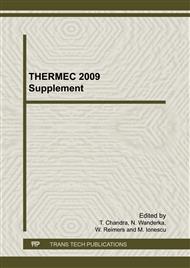p.250
p.256
p.262
p.268
p.275
p.281
p.285
p.290
p.295
Predicting the Effect of Compressive and Tensile Residual Stresses in Fracture Mechanics Specimens
Abstract:
This paper considers the prediction of the effects of tensile and compressive residual stress in fracture mechanics specimens by the application of a mechanical pre-load. This is considered in the context of a ‘C’ shape specimen which is mechanically pre-tensioned or pre-compressed to produce, respectively, a compressive or tensile residual stress in the region where the crack is introduced. Finite-element analysis is performed to simulate the pre-loading and the subsequent fracture loading of the cracked specimens. The finite-element predictions are compared with experimental data including residual stress measurements using neutron diffraction. A discussion is presented on modelling and material issues pertaining to the use of mechanical pre-loading as a means for introducing residual stress.
Info:
Periodical:
Pages:
275-280
DOI:
Citation:
Online since:
January 2010
Authors:
Price:
Сopyright:
© 2010 Trans Tech Publications Ltd. All Rights Reserved
Share:
Citation:


